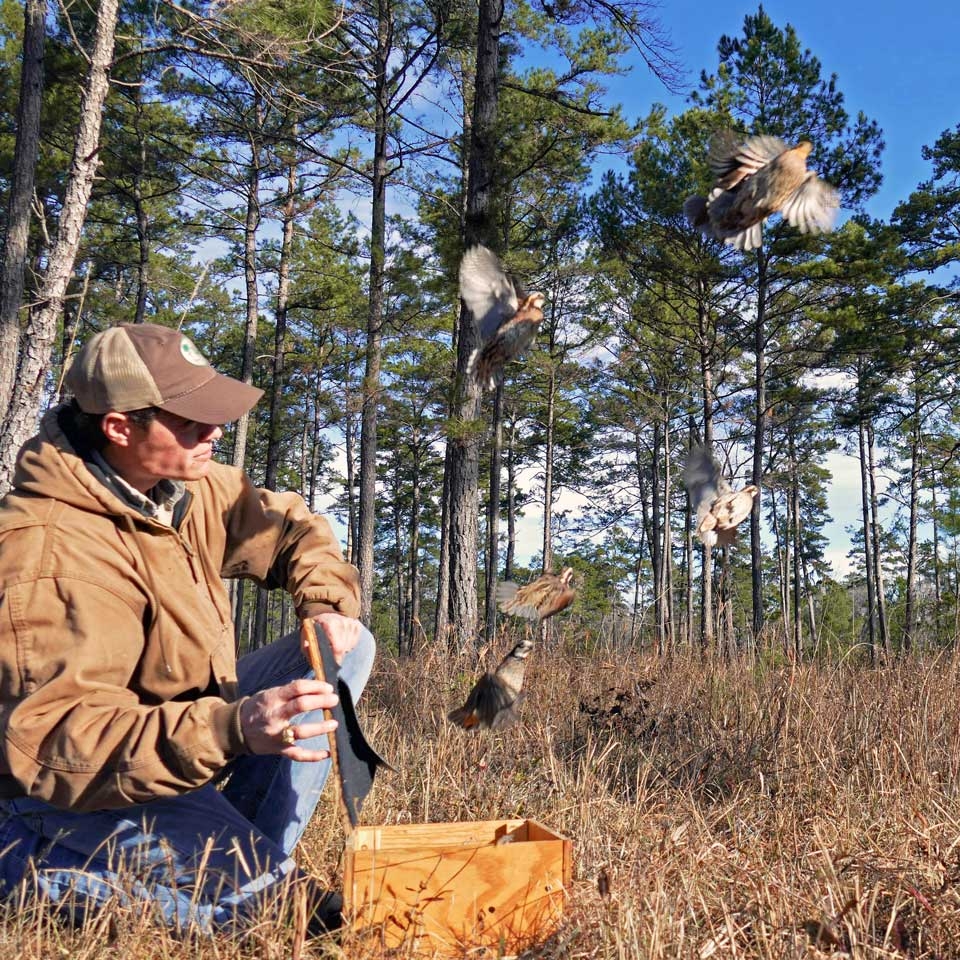New program brings science and past success to help restore bobwhite quail in Texas Pineywoods

Tall Timbers, a research station based in Tallahassee, Florida, announced the creation of a newpermanent program to restore bobwhite quail populations to parts of the Pineywoods ecoregion of Texas and beyond, using scientifically-based management and landowner outreach. The new Tall Timbers’ Western Pineywoods Quail Program is being launched with support from dedicated quail hunters, Tall Timbers, Texas Parks and Wildlife, and the Park Cities Quail Coalition.
Contact: Brad Kubecka, Tall Timbers Western Game Bird Program Director Email: bkubecka@talltimbers.org; Phone: 979-702-9681
New program brings science and past success to help restore bobwhite quail in Texas Pineywoods
Tall Timbers, a research station based in Tallahassee, Florida, announced the creation of a newpermanent program to restore bobwhite quail populations to parts of the Pineywoods ecoregion of Texas and beyond, using scientifically-based management and landowner outreach. The new Tall Timbers’ Western Pineywoods Quail Program is being launched with support from dedicated quail hunters, Tall Timbers, Texas Parks and Wildlife, and the Park Cities Quail Coalition.
The Pineywoods region once supported vibrant wild bobwhite populations, but has attracted very little research or management attention to restore the species for several decades.
Tall Timbers brings over 60-years of quail research and management experience to the challenge of reestablishing habitat, wild quail populations, and high-quality hunting opportunities. The organization is also a leader in the study and use of prescribed fire, a critical process for developing quality habitat for quail and other wildlife, as well as reducing wildfire risks.
With decades of historically high wild quail populations and record hunting success in their long-standing project areas from Albany, Georgia to Tallahassee, Florida, Tall Timbers has expanded to establish quail programs across the Southeast. Current regional quail programs include the Carolinas, central Florida, Alabama, and now the Pineywoods of East Texas, southern Arkansas, and western Louisiana.
When the habitat is right but the wild birds are not there, researchers turn to reintroduction as an option. Dr. Bill Palmer, President/CEO of Tall Timbers explains, “We are the foremost developer of translocation as a conservation tool for quail. By strategically moving wild quail from source areas with high populations to qualifying areas that have invested in the necessary habitat improvements, we have helped create over 80,000 acres of new wild quail lands.” Tall Timbers has been refining the quail translocation process for decades, and has moved over 7,000 wild quail to date.
Each ecoregion requires refining the base methods Tall Timbers has developed. The Pineywoods project will fine-tune management for quail in east Texas by studying radio tagged wild quail moved from Florida to explore their habitat use, survival rates, breeding success and other important demographics. These studies will help identify limiting factors to quail population growth and refine the management needed to correct them.
An 8,000+ acre private property in Polk County provides a core for the Western Pineywoods Quail Program to expand from. Habitat improvements including timber thinning, mulching, prescribed fire, and herbicide application began in 2019 and continue. It is important to build large blocks of high-quality habitat to support a quail population large enough to recover after a tough year.
The project is led by Brad Kubecka, a Texas native with a Master of Science in Range and Wildlife Management at Texas A&M-Kingsville, and currently a Ph.D. candidate at the University of Georgia. Kubecka is bridging quail recovery efforts in Texas as the Tall Timbers Western Gamebird Director, and as the new Executive Director of the Rolling Plains Quail Research Foundation in Roby, Texas. Dr. Palmer says, “Brad brings a unique perspective to quail research, having actively managed and studied quail in both the east and the west.”
With a solid background in research and pragmatic land management, Kubecka notes, “restoring habitat takes time, it’s a process. It’s not just one prescribed fire or other practice, it takes repetition and some time to shift the plants and get the habitat right for all the different needs that quail have.”
Knowing that time and consistency are needed for success in quail management, Tall Timbers has secured over half of a $4 million endowment campaign to secure the Pineywoods project positions in perpetuity, ensuring this region will always have a core of bobwhite research and stakeholder guidance. “We were fortunate to have a visionary supporter that saw the need for Tall Timbers in Texas”, said Dr. Palmer.
Kubecka is also excited about the opportunities to expand quail management to public lands, and has been coordinating with Texas Parks and Wildlife. He noted, “East Texas has a nice concentration of public lands along with public interest in quail hunting opportunities. It sets up the potential for this restoration work to expand out from our core private lands into places that will open quail hunting up to more people.”
Dedicated landowners and collaborators interested in being a part of bringing the iconic bobwhite whistle back to the Pineywoods region can contact Bradley Kubecka at bkubecka@talltimbers.org. Staff in the region are looking for properties to consult with —to create larger and larger blocks of land with suitable habitat to restore this species.
###

Irwin Greenstein is Publisher of Shotgun Life. Please send your comments to letters@shotgunlife.com.


Comments